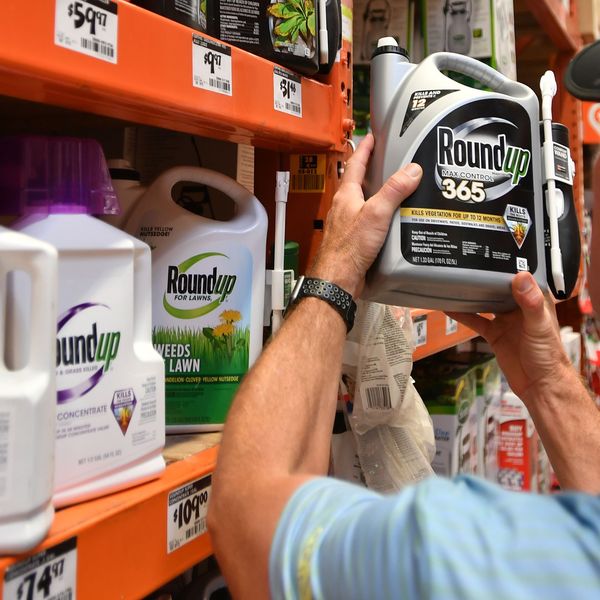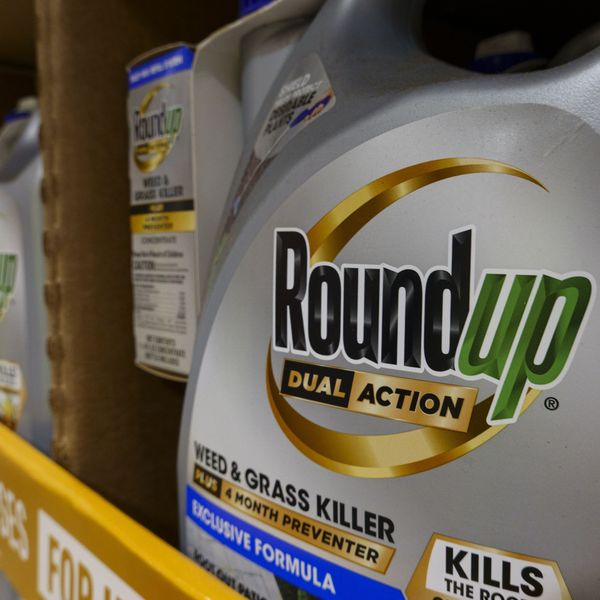
California is required under the Safe Drinking Water and Toxic Enforcement Act of 1986, better known as Proposition 65, to publish a regularly updated list of chemicals thought to cause cancer or birth defects," Newsweek noted. (Photo: Die Grunen Karnten)
In 'Remarkable' Rebuke to Monsanto, California Adds Roundup to Cancer Watchlist
"California's decision makes it the national leader in protecting people from cancer-causing pesticides."
In a move celebrated by scientists and activists, California on Monday announced it would add glyphosate--the active ingredient in the Monsanto-produced weed killer Roundup--to its list of chemicals known to cause cancer.
"California's decision makes it the national leader in protecting people from cancer-causing pesticides."
--Nathan Donley, Center for Biological Diversity
The decision, made by California's Office of Environmental Health Hazard Assessment (OEHHA), was reportedly precipitated by the World Health Organization's classification of glyphosate as a "probable carcinogen" in May of 2015.
"California is required under the Safe Drinking Water and Toxic Enforcement Act of 1986, better known as Proposition 65, to publish a regularly updated list of chemicals thought to cause cancer or birth defects," Newsweek reported.
Monsanto has been quick to respond to the move; as USA Today's Emily Bohatch noted, Monsanto is appealing a ruling on a case it brought against California last year, when the OEHHA first attempted to add glyphosate to its list of cancer-causing agents.
In response to the agrochemical giant's legal maneuvering, activists and scientists have insisted that Monsanto's motive is profit alone--not scientific accuracy or the health of the public--and hailed California's decision as a step in the direction of justice.
The Center for Biological Diversity (CBD) noted in a press release on Monday that a recent analysis "found more than half of the glyphosate sprayed in California is applied in the state's eight most-impoverished counties."
"The analysis also found that the populations in these counties are predominantly Hispanic or Latino," CBD continued, "indicating that glyphosate use in California is distributed unequally along both socioeconomic and racial lines."
Nathan Donley, a former cancer researcher and a senior scientist at the CBD, called California's move "remarkable" and congratulated the state for standing up to "special-interest politics [that] hamstring our federal government from taking action to protect people from this dangerous pesticide."
"California's decision makes it the national leader in protecting people from cancer-causing pesticides," Donley concluded. "The U.S. EPA now needs to step up and acknowledge that the world's most transparent and science-based assessment has linked glyphosate to cancer."
An Urgent Message From Our Co-Founder
Dear Common Dreams reader, The U.S. is on a fast track to authoritarianism like nothing I've ever seen. Meanwhile, corporate news outlets are utterly capitulating to Trump, twisting their coverage to avoid drawing his ire while lining up to stuff cash in his pockets. That's why I believe that Common Dreams is doing the best and most consequential reporting that we've ever done. Our small but mighty team is a progressive reporting powerhouse, covering the news every day that the corporate media never will. Our mission has always been simple: To inform. To inspire. And to ignite change for the common good. Now here's the key piece that I want all our readers to understand: None of this would be possible without your financial support. That's not just some fundraising cliche. It's the absolute and literal truth. We don't accept corporate advertising and never will. We don't have a paywall because we don't think people should be blocked from critical news based on their ability to pay. Everything we do is funded by the donations of readers like you. Will you donate now to help power the nonprofit, independent reporting of Common Dreams? Thank you for being a vital member of our community. Together, we can keep independent journalism alive when it’s needed most. - Craig Brown, Co-founder |
In a move celebrated by scientists and activists, California on Monday announced it would add glyphosate--the active ingredient in the Monsanto-produced weed killer Roundup--to its list of chemicals known to cause cancer.
"California's decision makes it the national leader in protecting people from cancer-causing pesticides."
--Nathan Donley, Center for Biological Diversity
The decision, made by California's Office of Environmental Health Hazard Assessment (OEHHA), was reportedly precipitated by the World Health Organization's classification of glyphosate as a "probable carcinogen" in May of 2015.
"California is required under the Safe Drinking Water and Toxic Enforcement Act of 1986, better known as Proposition 65, to publish a regularly updated list of chemicals thought to cause cancer or birth defects," Newsweek reported.
Monsanto has been quick to respond to the move; as USA Today's Emily Bohatch noted, Monsanto is appealing a ruling on a case it brought against California last year, when the OEHHA first attempted to add glyphosate to its list of cancer-causing agents.
In response to the agrochemical giant's legal maneuvering, activists and scientists have insisted that Monsanto's motive is profit alone--not scientific accuracy or the health of the public--and hailed California's decision as a step in the direction of justice.
The Center for Biological Diversity (CBD) noted in a press release on Monday that a recent analysis "found more than half of the glyphosate sprayed in California is applied in the state's eight most-impoverished counties."
"The analysis also found that the populations in these counties are predominantly Hispanic or Latino," CBD continued, "indicating that glyphosate use in California is distributed unequally along both socioeconomic and racial lines."
Nathan Donley, a former cancer researcher and a senior scientist at the CBD, called California's move "remarkable" and congratulated the state for standing up to "special-interest politics [that] hamstring our federal government from taking action to protect people from this dangerous pesticide."
"California's decision makes it the national leader in protecting people from cancer-causing pesticides," Donley concluded. "The U.S. EPA now needs to step up and acknowledge that the world's most transparent and science-based assessment has linked glyphosate to cancer."
In a move celebrated by scientists and activists, California on Monday announced it would add glyphosate--the active ingredient in the Monsanto-produced weed killer Roundup--to its list of chemicals known to cause cancer.
"California's decision makes it the national leader in protecting people from cancer-causing pesticides."
--Nathan Donley, Center for Biological Diversity
The decision, made by California's Office of Environmental Health Hazard Assessment (OEHHA), was reportedly precipitated by the World Health Organization's classification of glyphosate as a "probable carcinogen" in May of 2015.
"California is required under the Safe Drinking Water and Toxic Enforcement Act of 1986, better known as Proposition 65, to publish a regularly updated list of chemicals thought to cause cancer or birth defects," Newsweek reported.
Monsanto has been quick to respond to the move; as USA Today's Emily Bohatch noted, Monsanto is appealing a ruling on a case it brought against California last year, when the OEHHA first attempted to add glyphosate to its list of cancer-causing agents.
In response to the agrochemical giant's legal maneuvering, activists and scientists have insisted that Monsanto's motive is profit alone--not scientific accuracy or the health of the public--and hailed California's decision as a step in the direction of justice.
The Center for Biological Diversity (CBD) noted in a press release on Monday that a recent analysis "found more than half of the glyphosate sprayed in California is applied in the state's eight most-impoverished counties."
"The analysis also found that the populations in these counties are predominantly Hispanic or Latino," CBD continued, "indicating that glyphosate use in California is distributed unequally along both socioeconomic and racial lines."
Nathan Donley, a former cancer researcher and a senior scientist at the CBD, called California's move "remarkable" and congratulated the state for standing up to "special-interest politics [that] hamstring our federal government from taking action to protect people from this dangerous pesticide."
"California's decision makes it the national leader in protecting people from cancer-causing pesticides," Donley concluded. "The U.S. EPA now needs to step up and acknowledge that the world's most transparent and science-based assessment has linked glyphosate to cancer."

